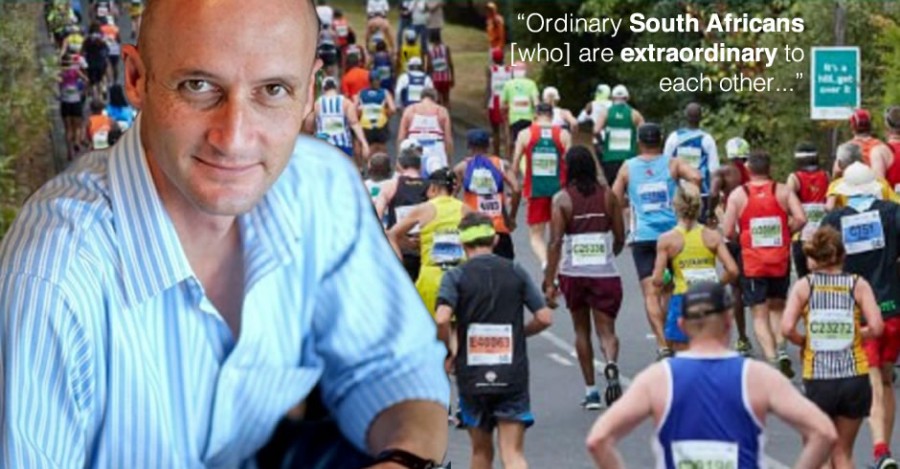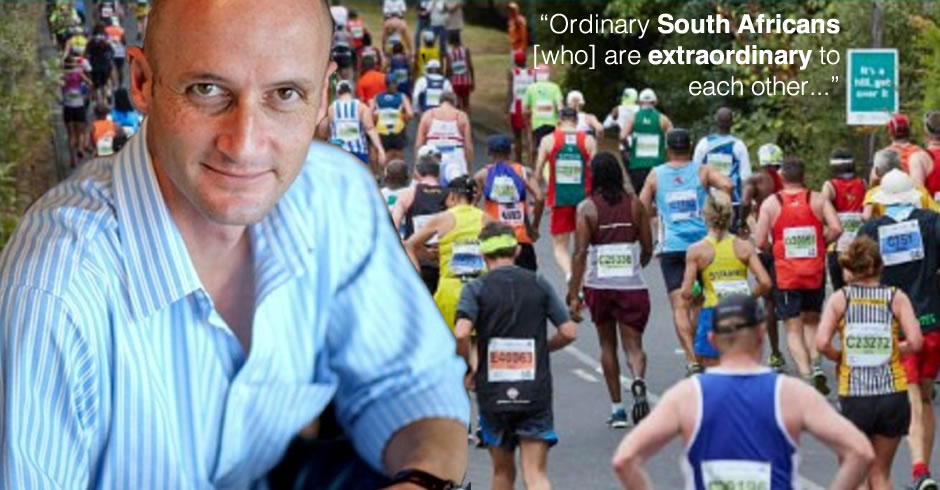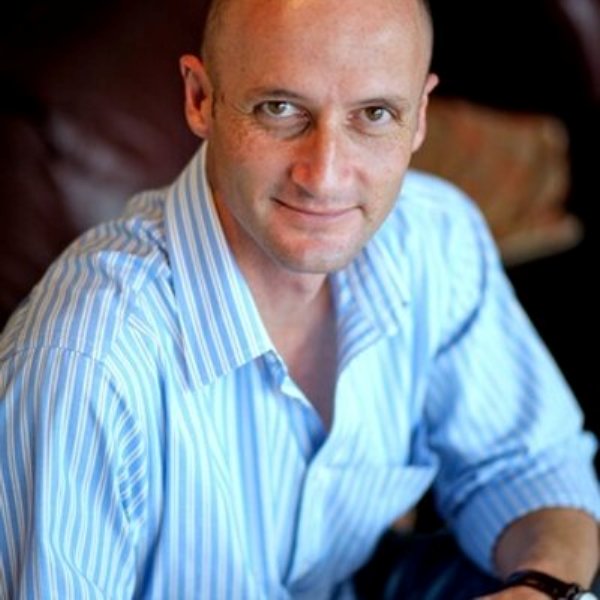
What I Learned about Race on the Two Oceans Marathon
A Facebook post about race, and the ordinary and extraordinary people of this country, has gone viral… touching the hearts of many South Africans who recognise the truth in these words. With kind permission, we hereby republish the post, written by sports journalist Michael Vlismas after his experience at the Two Oceans Marathon in the Western Cape […]

A Facebook post about race, and the ordinary and extraordinary people of this country, has gone viral… touching the hearts of many South Africans who recognise the truth in these words. With kind permission, we hereby republish the post, written by sports journalist Michael Vlismas after his experience at the Two Oceans Marathon in the Western Cape over the Easter Weekend, an event which has as its motto #RunAsOne…

What I Learned about Race on the Two Oceans Marathon – by Michael Vlismas
You learn so much about yourself when you run 56 kilometres. And one thing I learnt in running my first Two Oceans ultra marathon this Easter weekend is that my faith in my fellow South Africans is not misplaced.

It’s so easy to see the news and believe we live in a country being ripped apart across racial lines.
It’s easy to make the mistake and believe that South Africans are all racists who argue about colour and language and cannot live side by side.
But when you run 56 kilometres on the streets of South Africa with South Africans, you realise what a lie this is.
It’s a lie perpetuated by our politicians who specialise in highlighting what keeps us apart so that we may, out of fear for each other, support whatever agenda they push onto us.
But this is not the real South Africa.
The real South Africa is what I saw during my race.
I saw South Africans of all races and languages doing exactly what this year’s race asked of them – to run as one.
And they do it so easily, because ordinary South Africans are all one at heart.
I saw runners stop to help a fellow runner who tripped and fell. I even saw one runner turn around and run back after he’d heard a runner fall behind him.
As we ran through Kalk Bay, we clapped hands for the two old white rockers who’d set up in their roadside garage and were cranking out some amazing tunes on their electric guitars.
There was also a lady and her young children in their driveway making pancakes for the runners. And further on, the coloured ladies were there handing out their baby potatoes.
I heard that most beautiful way of the black man who, when an elderly white man walked to the side of the road and declared his race over, exclaimed, “Sorry Baba. Sorry”. Just a simple way to say I share in your suffering. Or maybe even more significant, I recognise your suffering. You are not invisible.
When we reached the start of Chapman’s Peak, I felt my legs falter at the thought of the climb to come.
And then a bus came up behind me. A Cape Muslim man was at the front of it, and we took on that hill together. He carried about 50 of us up that hill, telling us when to stop and walk and then when to start running again. I know for a fact I would not have made that hill without him.
That’s what South Africans do. Sometimes we run up a hill together. Sometimes we have to walk. But always we keep moving forward together.
And when we reached the top, a Kaapse Klopse band heralded our achievement with their trademark music, playing it with such passion that I know listening to a symphony in the Sydney Opera House wouldn’t have come close to moving me as much as this did.
I ran through Hout Bay, where people from the squatter camp had come to join in the throngs of people lining the road and cheering us on.
When we reached Constantia Nek, I was forced to stop and walk. “Michael from Strand,” said a voice behind me, reading my name and club on my vest. “Are you okay my friend?”
An Indian man pulled up next to me, and put his hand on my shoulder.
“Ja. It’s just a bit eina,” I told him.
“Me too, my friend. I’m also hurting. I’m just hiding it better than you. C’mon, let’s go together.” And so I started running again. I think about what he said. We are all hurting. Some of us just hide it better. So many South Africans hide their own hurt, but are there to help others.
During this climb, we had some help from a group of Zulu runners. We heard them from behind, their rhythmic Zulu chanting sounding like Shaka’s very own warriors. Two of them had adorned their caps with impala skins, and one blew a whistle as they ran in unison.
Once at the top of Constantia Nek, there are some sneaky hills thereafter. Some runners in my club call them the “Dammit Hills” because you don’t expect them.
Two Indian men were running behind me as we hit the first of these, and I couldn’t help but smile as I heard him say to his friend, “No man, now I’m just bedonnerd”. Bedonnerd. What a fantastic word. In that moment, there was no question of the politics of language. No tearing down statues or protesting for the rights of only one language. Just a moment of being purely South African. Words like lekker and bru and bra and eish! and yebo and so many other words that are more a part of our South Africanness than any legislation could ever force upon us.
As we sang the national anthem at the start of the race, I wondered how many of those people protesting for just one language or asking, “What is the purpose of Afrikaans or Zulu or Sotho? Why not just English?” could sing only the English parts of their own national anthem, while their brother standing next to them could sing every verse?
And as we hit the home stretch into the stadium, and we ran across the finish line, a black man who finished next to me put his arm around me and said, “We did it!”
You know what, we did.
For one day, once again, ordinary South Africans did it.
They came out in their thousands, stood on the side of the road and cheered for their fellow South Africans from the start to the finish.
They showed each other compassion, gave each other hope, inspired each other, helped each other.
Because that’s who we are.
We are not the divided people our politicians would have us believe we are.
We are not a society filled with hatred.
We get on with this business that is South Africa. Sometimes we stumble. Sometimes we walk. And sometimes we run. But we always get on with it, together.
We are ordinary South Africans who do what ordinary South Africans do. We are extraordinary to each other.
Every. Single. Day.
Best wishes,
Michael Vlismas
This post first appeared on Facebook and is republished here with the kind permission of Michael Vlismas – golf journalist, author and owner of Michael Vlismas Media sports agency. Follow Michael on Twitter: @MichaelVlismas
